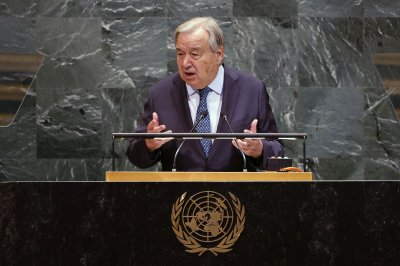U.N. says U.S. is obligated to continue funding amid withdrawals

Jan. 8 (UPI) — Despite the Trump administration withdrawing the United States from 31 U.N. entities, the U.S. is obligated to continue providing assessed funding amounts, U.N. officials said on Thursday.
Despite the changes, U.N. Secretary-General Antonio Guterres the U.N.’s work will continue, and all member states, including the United States, are obligated to provide assessed contributions to the U.N.’s “regular and peacekeeping budgets” that have been approved by the General Assembly.
U.N. officials said they will continue to “deliver for those who depend on us” and “will continue to carry out our mandates with determination,” spokesman Stephane Dujarric said in a prepared statement.
“The secretary-general regrets the announcement by the White House regarding the United States’ decision to withdraw from a number of United Nations entities,” Dujarric continued.
“Assessed contributions to the United Nations’ regular budget and peacekeeping budget, as approved by the General Assembly, are a legal obligation under the U.N. Charter for all member states, including the United States,” he said.
“All United Nations entities will go on with the implementation of their mandates as given by member states.”
President Donald Trump announced the U.S. is withdrawing its participation in and funding for 66 international organizations, treaties and conventions and signed an executive order proclaiming such on Wednesday.
The decision affects U.S. participation in 31 U.N. entities, including its Population Fund that supports maternal and child health and combats sexual and gender-based violence.
The U.S. also is withdrawing from the U.N. Framework Convention on Climate Change, the U.N. Democracy Fund and other units within the U.N. Secretariat that are based in New York City and elsewhere.
The U.S. withdrawal from the UNFCCC marks a significant change in global cooperation on climate change, UNFCC Executive Sec. Simon Stiell said.
“While all other nations are stepping forward together, this latest step back from global leadership, climate cooperation and science can only harm the U.S. economy, jobs and living standards, as wildfires, floods, mega-storms and droughts get rapidly worse,” Steill said.
“It is a colossal own goal which will leave the U.S. less secure and less prosperous,” he added.
The U.S. also is withdrawing from and ceasing all participation in the U.N.’s regional commissions for the Asia-Pacific, Western Asia, Africa and Latin America and the Caribbean regions.
